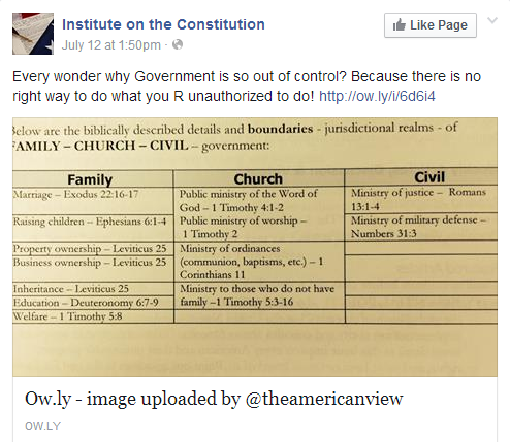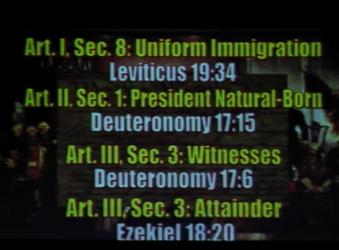I will add to these through the day and maybe into tomorrow. For now, between yard work and naps, I am researching some of the claims made by David Barton (see links below) and trying for myself to figure out what reasonable religious accommodations would look like in this situation.
While I don’t agree with Davis, I think these kind of cases are incredibly interesting. I believe that religious accommodations need to be considered (see Volokh’s article linked below) in her case.
David Barton has been in rare form over this matter. He has incorrectly said that God’s law trumps man’s law in a republic, that God’s law should be followed before the Constitution and that judges can’t compel arrests of people in contempt of court.
Sense:
Thoughtful article by Eugene Volokh on religious accommodations
GOP presidential candidate John Kasich on Kim Davis
Why Kim Davis is no hero to religious liberty
Good summary of why KY law may prevent a religious accommodation
Nonsense:
David Barton 1 – Barton’s assertion that a republic is about God’s law trumping man’s law.
David Barton 2 – Barton says courts can’t order a person to court. The U.S. Code says differently. See also this helpful summary.
David Barton 3 – Three reasons why Christians who think Davis should do her job are wrong.
Mike Huckabee’s Rally
Tag: constitution
The Institute on the Constitution's Imaginary Constitution
On the Institute on the Constitution’s Facebook page, the following image was posted on July 12:

The IOTC teachers Michael Peroutka and David Whitney believe that government has no role in the areas listed under family and church in this image above. This is apparently derived from the work of Abraham Kuyper and Christian reconstructionist Rousas Rushdoony (see this source).
As I looked at this, my reaction was that the IOTC teaches the Constitution of their imagination, not the actual one. According to Article 1, Section 8 of the Constitution, the Congress has the power “to regulate Commerce with foreign Nations, and among the several States, and with the Indian Tribes.” Congress also has the power to establish laws on bankruptcies and to make laws necessary to carry out Congressional powers. However, the IOTC teaches that families have jurisdiction over property and business ownership. Surely, property and business ownership cannot be left to individual families without some form of government regulation to protect the rights of all concerned. Bankruptcies involve individuals (often involving personal property and business ownership) but according to the Constitution, the Congress has the power to make laws regarding this aspect of commerce. Does the IOTC teachers think the Constitution has too much power?
Article 3, Section 2 establishes the courts to decide disputes between citizens over lands (property ownership) as well as other disputes between citizens. The actual Constitution gives citizens a judicial system as a protection. Families may not violate the rights of their members simply because they are biologically related. Churches may not violate the rights of their members simply because a member has signed a church covenant.
Article 4, Sections 2 requires that citizens in one state have the same rights in the several states. Article 6 makes the Constitution the supreme law in the land. The 7th Amendment in the Bill of Rights provides for the right of jury trial. Families and churches cannot claim exemption when disputes arise involving those spheres.
Families can govern their affairs, and churches have freedom to hold their beliefs sacred, unless those activities conflict with the Constitution and the powers given to civil government by it. We will always have debates about what those various limits are, but civil government has a much wider jurisdiction in the actual Constitution than in the one the IOTC teaches.
The IOTC course which is sweeping through Ohio and Maryland especially is particularly dangerous because it claims to teach about the U.S. Constitution but actually seeks to place the Christian reconstructionist interpretation of the Bible over the Constitution.
I prefer the actual Constitution.
The David Barton Dozen: Ecclesia College (AR)
In October of last year, David Barton said there are about a dozen colleges that he believes are right on history and the Constitution. John Fea identified six of them as
Liberty University Law School
Ohio Christian University
Oklahoma Wesleyan University
Pensacola Christian College
Brewton-Parker College
Louisiana College
I think a seventh can be added: Ecclesia College in Arkansas.
Barton is on the Board of Regents and recently spoke there. While in the area, he spoke to a group of GOP state legislators demonstrating again his hard-to-explain influence. Even though he teaches things like the Constitution quotes the Bible verbatim and the Bible is a part of our law via the 7th Amendment, GOP legislators can’t seem to get enough of him. Neither of those claims are true of course, but that doesn’t stop him.
All posts on David Barton.
David Barton’s Biblical Constitution: What If The Constitution Really Quoted The Bible?
I’ve addressed this before but it seems worth noting again. David Barton, with a straight face, says the Constitution quotes the Bible. He and Mat Staver discussed this claim on a Liberty Counsel segment recently. Begin watching at 4:30):
Again with ankle biting Bible verses.
In speech to Crossroads Church in OK, Barton listed some of the verses he says are quoted in the Constitution. Take a look:
Let’s take one — Leviticus 19:34 — and see if we can find it quoted in the Article 1, Section 8 where Barton says it is. Here is the Leviticus verse:
The foreigner residing among you must be treated as your native-born. Love them as yourself, for you were foreigners in Egypt. I am the LORD your God.
Barton says this verse is quoted in Article 1, Section 8 and specifically references “uniform immigration.” Here is what the Constitution says on this point:
To establish an uniform Rule of Naturalization, and uniform Laws on the subject of Bankruptcies throughout the United States;
The rest of Article 1, Section 8 describes the other powers of Congress, and does not quote from Leviticus.
Let’s take this a little further. What if the Constitution did quote Leviticus 19:34? For discussion’s sake, let pretend that Leviticus 19:34 was rephrased in legal terms in a section I’ll invent as Article IV, Section 5:
The foreigner living among you must be treated as a natural born citizen. Foreigners shall be entitled to all privileges and immunities of citizens in the several States.
If the Constitution included such language, immigrants would have rights they don’t have now and there would no need for immigration reform. Rather, the Constitution invests Congress with the powers to make laws and establish policies (which could do what this verse suggests if the political process leads to that end).
If the Constitution quoted Deuteronomy 17:15, the nation would need to discern somehow who God had chosen to be king. Also, in Deut. 17:20, the Bible notes that the chosen king’s descendants will rule a long time if the king follows God’s instructions. Clearly, our Constitution does not reflect those Bible verses. Furthermore, one does not need the Bible to see the reasonableness of requiring citizenship as a condition of political leadership.
I could go on, but hopefully it is clear that when Barton claims the Constitution quotes Bible verses, he must be referring to some other Constitution.
Institute on the Constitution: Notes on Session 10 – War Between the States and Women's Suffrage Dilutes the Franchise
I have been watching the Institute on the Constitution course on the National Religious Broadcasters network on Thursday nights. Last night was session 10 and covered amendments 11 through 27. I have raised numerous issues with the course over the first nine sessions, and session 10 only added to my negative reaction.
At this point, I am just going to supply some observations about the course from memory. I may do a more detailed follow up next week.
Discussing the 13th Amendment, Peroutka disparaged the Emancipation Proclamation as a political ploy on Lincoln’s part. In his discussion of the 13th Amendment, Peroutka correctly said that the amendment freed the slaves but then added that subsequent actions made us all slaves. He compared the military draft and income tax to the enslavement of blacks. To me, this comparison crudely minimizes the awfulness of slavery.
He had little good to say about the 14th Amendment. Consistent with his status of board member of the League of the South, he make the Confederate case that the amendment was never legally ratified.
Throughout his discussion of the Reconstruction amendments (13-15), Peroutka referred to the Civil War as “The War Between the States.” When David Whitney came forward to discuss his view that the 16th Amendment did not actually authorize a federal income tax, he called the Civil War, “The War for Southern Independence.” These designations are consistent with Peroutka’s view that the wrong side won the Civil War.
Probably the oddest position taken was opposition to the 19th Amendment. Peroutka complained that a woman’s right to vote “dilutes the franchise.” He said he often gets strong reaction to his position (I wonder why) but he explained that a married female voting may cancel out the vote of her husband. He painted a picture of the family being represented at the voting booth by the husband. If a woman has no husband then she could vote, but otherwise he believes women should be represented by their husbands at the polls.
How about that ladies?
There were other things that raised my eyebrows but I need to do a bit more research before I write about them.
